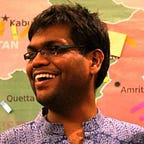Tools of Transformation: Notes from a Peacebuilder
(I wrote this piece on November 1, 2016 for the Postcards for Peace blog. I realized that a lot of it is relevant today, so I am re-posting it here.)
It has been a week since I got certified as a Global Youth Peace Ambassador after my participation in a five-day Training of Trainers on Youth and Peacebuilding at the Rajiv Gandhi National Institute of Youth Development, Chandigarh, India. As I sit back and reflect on what made this programme, co-hosted by the Commonwealth Youth Peace Ambassadors Network, so deeply enriching for me, I wonder if here is the brief our facilitators Mansi Panjwani, Abha Jeurkar and Ajatshatru had in mind: “How do we train a group of over 50 young peacebuilders from eight different countries with diverse life experiences in a way that is personally meaningful, theoretically sound, and professionally useful?” If that is the case, I think they managed to accomplish these goals quite successfully. The eight countries represented were India, Malaysia, Afghanistan, Bangladesh, Nepal, Sri Lanka, Myanmar, and the Maldives.
These, broadly, are some of the ways in which this training created value in my life.
- The facilitators were generous while sharing the thought process behind the design of their sessions. That helped me appreciate how each little element played a role in the big picture. I learnt how to be more discerning when I plan my own sessions as a trainer.
- The facilitators focused on creating numerous opportunities for participants to talk to each other. At the very outset, they acknowledged that the collective experience of the participants was richer than what the three of them brought to the the table. It takes a lot of humility to recognize this. I learnt how to cultivate respect for the participants of any training that I am invited to lead.
- The facilitators seemed acutely conscious of the energy of the group at any given time. There was sufficient variation in terms of what the activities demanded — visual, kinesthetic, verbal, spatial, and other abilities. I learnt how to account for multiple intelligences and diverse learning styles while planning my own sessions in the future.
- The facilitators encouraged the participants to be open to a variety of activities but also introduced the concept of ‘challenge by choice’. If, for any reason — be it emotional, physical, cultural, or some other kind — a participant wanted to opt out of an activity, they could do so. I learnt how important it is to make all participants feel safe and cared for.
- The facilitators insisted that participants use the first person pronoun ‘I’ while describing experiences in order to take ownership of thoughts, feelings, needs and requests instead of making broad, general claims on behalf of the whole group by saying ‘we’. I learnt to think carefully before raising my hand to speak up, and to use words that would get to the heart of my experience without beating about the bush.
- The facilitators modelled how to offer peer feedback in small group tasks in a way that emphasized what went well, and gently suggested how an individual’s performance could be even better. I learnt how to frame my observations in a manner that was helpful and encouraging, and did not try to show off my own knowledge on a particular topic.
- The facilitators employed the principle of moving from the concrete to the abstract. Intellectual engagement around a concept was always preceded by experiential learning. I learnt how to scaffold learning in a group that has participants varying quite a bit in terms of age group and professional experience.
- The facilitators played games that were inclusive, easy to learn, did not have elaborate or complicated rules, were co-operative in nature, did not require any specialized training, and did not leave any scope for body shaming. I learnt how to infuse learning with a raw sense of delight, which not only makes participants loosen up but also creates strong bonds of friendship between them.
- The facilitators got us to agree that each participant would maintain absolute confidentiality about personal stories that were shared in pairs and small groups. I learnt how trust is a gift that people offer each other, and they need to feel that it won’t be abused in order for them to be truly authentic and vulnerable.
- That is a whole lot, in just five days, and I am sure that it will deepen the quality of my own work as a peacebuilder. I am filled with gratitude towards all the facilitators, my fellow participants who are now dear friends, and the organizers who brought us all together. Together, we will transform ourselves and this world of ours.
